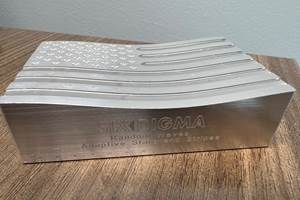Estate Plan Secrets They Don’t Reveal in Law School
A successful plan uses a variety of strategies to cut taxes and create more wealth.
Share






Hwacheon Machinery America, Inc.
Featured Content
View More
ECi Software Solutions, Inc.
Featured Content
View More

The three most common questions I am asked when business owners contact me about estate planning are:
1. Can you value my business?
2. Can you help me sell/transfer my business in the most tax-effective way?
3. Can you give me a second opinion on my existing estate plan?
More than 50 years’ experience in estate planning has taught me that a successful consultation really must address all three questions, because 1) a valuation usually involves some kind of sale or transfer, and both have significant tax consequences; 2) the sale or transfer of a business requires a valuation; and 3) if you own a business, your estate plan cannot be complete without a valuation and a transfer/sale plan.
“Transfer” means a sale, gift or bequest to family members. “Sale” means the actual sale of your business to a non-family member.
Obviously, the sale or transfer of your business can take place during your lifetime or after your death. However, an unplanned sale after death almost always results in disaster—economically, tax-wise and in the form of fighting among your heirs. So, it is better to address the succession of your business while you are still alive and well.
The answers to each of the three questions above lie in closely held “secrets” they typically don’t teach you about in law school.
Business Valuation
Determining the value of a business may seem like a somewhat simple task on the surface, but the secret is how to maximize a discount on that value for tax purposes. For example, Success Co. is owned 100 percent by Joe but is now run by Joe’s son, Sam. Joe wants to sell Success Co. to Sam for $8.6 million, the value of the business as determined by a professional appraiser.
The secret technique: Joe recapitalizes Success Co. into 100 shares of voting stock and 20,000 shares of non-voting stock—a tax-free transaction. Then, only the non-voting stock will be sold to Sam, using an intentionally defective trust (IDT).
Under current tax laws, that non-voting stock is eligible for various discounts totaling 40 percent, resulting in an updated appraisal value of $5.1 million for the non-voting stock. Joe keeps the voting stock, valued at $100,000, so he can retain control of Success Co.
Transfer/Sale of the Business
If Joe sells Success Co. outright to Sam, each $1 million of the sale price essentially will be hit with three separate taxes.
For every $1 million Sam will pay, he must actually earn $1.666 million, because federal and state income taxes will claim 40 percent, or $666,000. Then, each $1 million will be hit with a capital gains tax on Joe that puts $200,000 of it in the hands of the IRS. Finally, at Joe’s death, estate taxes will siphon off another 40 percent ($320,000) of the remaining $800,000. All this means that for every $1 million of the sale price, Sam really needs $1.666 million, and Joe’s estate will only end up with $480,000.
The secret technique: Instead of an outright sale, Joe sells Success Co.’s non-voting stock for the same $5.1 million to an IDT and gets paid in full with an interest-bearing note from that IDT. Sam is the trust’s beneficiary and has no obligation to pay the note. Instead, cash flow from Success Co. is used to pay both the note and interest. Under tax laws, every penny Joe receives as payment of the note plus interest is tax-free—no capital gains tax or income tax.
Joe and Sam will save about $200,000 in taxes for each $1 million of the sale price.
Reviewing the Overall Estate Plan
In addition to Success Co., Joe and his wife, Mary, have another $10.4 million in assets, including two homes, a 401(k) and various other investments. Based on their existing estate plan, income and estate taxes on these investments would be $3.5 million if they died today.
A review of this existing plan found that it was missing a variety of lifetime strategies that could be used not only to eliminate the estate tax, but also to create an additional $2.5 million in tax-free wealth.
The secret techniques: First, Joe and Mary purchase tax-free, second-to-die life insurance, funding the premium payments with the 401(k) money, which is subject to both income and estate taxes. They also set up an ongoing annual gifting program for their children and grandchildren. In addition, they create a family limited partnership for their investments and a charitable lead annuity trust to donate money to their alma mater.
As you can see, there are a number of “secret” strategies you can employ to leave as much of your wealth intact as possible for your family after your death. Just knowing the value of your business and selling it is not enough. You must do so in the most tax-effective way possible.
Related Content
Building Machines and Apprenticeships In-House: 5-Axis Live
Universal machines were the main draw of Grob’s 5-Axis Live — though the company’s apprenticeship and support proved equally impressive.
Read MoreHow to Pass the Job Interview as an Employer
Job interviews are a two-way street. Follow these tips to make a good impression on your potential future workforce.
Read MoreDN Solutions Responds to Labor Shortages, Reshoring, the Automotive Industry and More
At its first in-person DIMF since 2019, DN Solutions showcased a range of new technologies, from automation to machine tools to software. President WJ Kim explains how these products are responses to changes within the company and the manufacturing industry as a whole.
Read MoreHow I Made It: Amy Skrzypczak, CNC Machinist, Westminster Tool
At just 28 years old, Amy Skrzypczak is already logging her ninth year as a CNC machinist. While during high school Skrzypczak may not have guessed that she’d soon be running an electrical discharge machining (EDM) department, after attending her local community college she found a home among the “misfits” at Westminster Tool. Today, she oversees the company’s wire EDM operations and feels grateful to have avoided more well-worn career paths.
Read MoreRead Next
5 Rules of Thumb for Buying CNC Machine Tools
Use these tips to carefully plan your machine tool purchases and to avoid regretting your decision later.
Read MoreRegistration Now Open for the Precision Machining Technology Show (PMTS) 2025
The precision machining industry’s premier event returns to Cleveland, OH, April 1-3.
Read MoreBuilding Out a Foundation for Student Machinists
Autodesk and Haas have teamed up to produce an introductory course for students that covers the basics of CAD, CAM and CNC while providing them with a portfolio part.
Read More












































